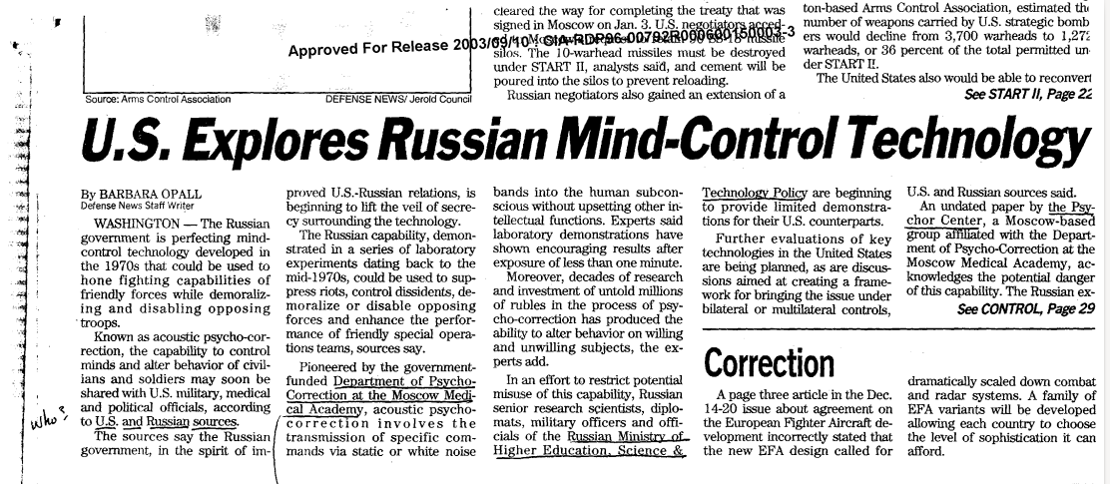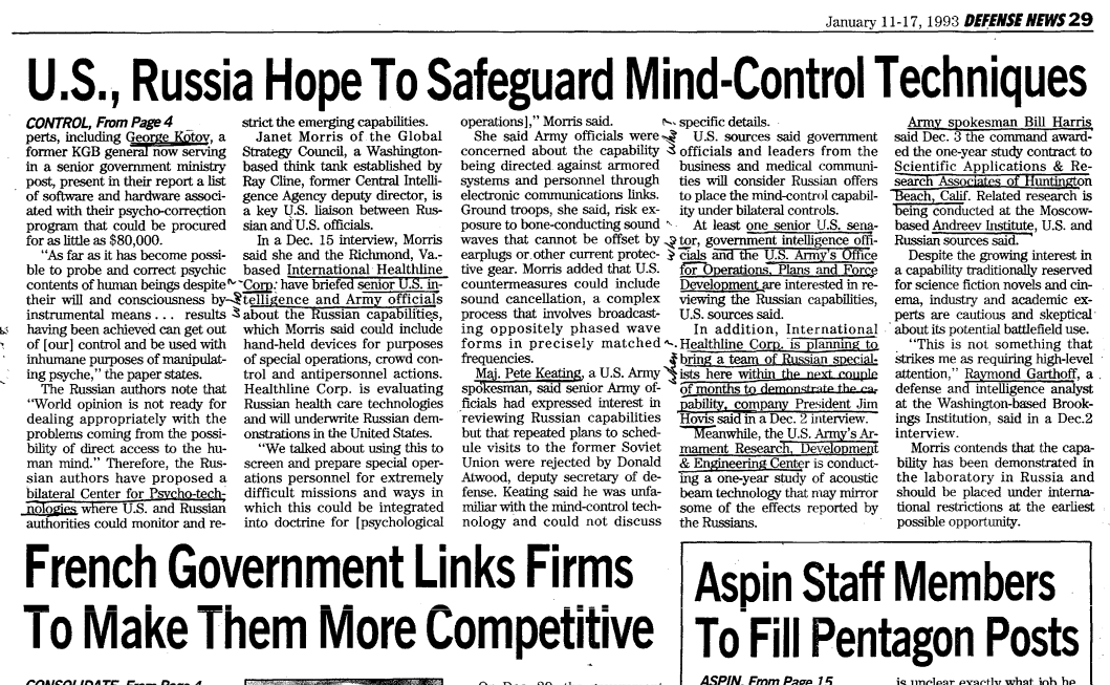Bellow is an article from a January issue (1993) from the military magazine Defense News signed by Barbara Opall. Starts in page 4 and is referenced in page 39 in continuation.
Key info:
- Russian has mind control technologies since the 70's and they were imported to the US in the early 90's.
- The technology can beam commands into someones unconscious. It can both "probe and correct the psychic contents of human beings despite their will or conscience"
- A multilateral agreement was made to keep the technology a secret, because "the world isn't ready to deal with it".
- Not only government official - political, intelligence and army - know about it, but business and medical community leaders.
- It apparently includes handheld devices.
- "Voice to skull" (bone-conducting sound waves) was explicitly mentioned.
- A few key people were cited as having get in touch with the technology, specially Janet Morris, who ate the time worked for the Global Strategy Council.
Summary:
- Russians have Mind-Control technologies and techniques since the 70's, which are still being improved.
- It is implied this mind control technology can be used in the battlefield (that is - it doesn't require a controlled environment, like a lab)
- The technology was to be shared in the 90's with american military, medial and political personel.
- Authorities planned to hide the technology because the 'world wasn't ready' to deal with its possibilities: "The Russian authors note that 'World opinion is not ready for dealing appropriately with problems coming from the possibility of direct access to the human mind.' Therefore, the Russian authors have proposed a bilateral center for Psycho-technologies where the US and Russian authorities could monitor and restrict the emerging capabilities.'
- The technology could be used to suppress riots, control dissidents, demoralize or disable oposing forces.
- It was created by the Department of Psycho-Correction at the Russian Academy of Sciences and workds by transmitting commands via white noise into the subconscious without affecting other brain functions. Results can (at that time) be achieved in less than a minute of exposure. It also showed the capacity of changing the behavior of willing or unwilling subjects.
- "Fearful of misuse", US and Russia planned a framework for bilateral or multilateral control of the technology. Russian experts, including ex KGB George Kotov, said hardware and software needed for the technology could be acquired for as little as $80,000 (in 1993). "As far as it has become possible to probe and correct psychic contents of human beings despite their will and consciousness by instrumental means ... results having been achieved can get out of [our] control and be used with inhumane purposes of manipulating the psyche".
- "World opinion is not ready for dealing appropriately with the problems coming from the possibility of direct access to the human mind." Therefore, the Russian authors have proposed a bilateral Center for Psycho-technologies where U.S. and Russian authorities could monitor and restrict the emerging capabilities.
- The conversation between Russian and American parties was intermediated by Janet Morris, from the Global Strategy Council (founded by Ray Cline, ex CIA). She briefed senior US intelligence and Army officials on Russian capabilities, which include hand-held devices for purpose of special operations, crowd control and antipersonnel weapons. They planned to use this technology in psyops.
- Officials were worried that troops would be vulnerable to bone to bone-conducting sound waves through electronic communication links, even in armored systems. Countermeasures would include broadcasting sound cancellation waves (waves that are in the precise inverse phase of the attacking wave).
- Government officials, business and medical community leaders were willing to consider the technology under controls.
- US Army's Armament Research, Development & Engineering Center researched acoustic beam technology that could mirror part of the Russian technology properties.
- International Healthline Corps demonstrated interest in the technology.
- Some questioned the usefulness of such technology in the battlefield, like analyst Raymond Garthoff.
- Janet Morris defended that the capabilities shown in laboratory by the Russians should be put under control as early as possible.
Key names:
- Barbara Opall - Author of the article.
- Janet Morris, from the Global Strategy Council - Who as managing the relations between american and Russian officials
- Ray Cline, Former CIA deputy director and founder of the Global Strategy Council.
- Major Pete Keating - army spokesman interested in the soviet technology.
On Russian 'Psycho Correction'
Extracted from the Wikipedia page on Igor Smirnov (a leading scientist on the subject). Please note:
- The fact that it aimed at behavior modification (namely of people with addiction and mental illness).
- The link with Janet Morris (in charge of the US-Russia exchange) and her husband Chris Morris.
- The mention of the companies ManTech SRS Technologies and Northam Psychotechnologies as being in charge of developing those technologies.
"Smirnov's background included military research, and the care of drug addiction and mental illness. He founded the Psychotechnology Research Institute at the Peoples' Friendship University of Russia to work on ideas like "psychocorrection", a term he used to denote the use of subliminal messages to alter a subject's will, or even modify a person's personality without their knowledge.
The Institute caught the attention of Chris Morris and Janet Morris who were reportedly attempting to sell technology to the United States military. The FBI consulted Smirnov regarding the Waco Siege in 1993. Smirnov proposed piping subliminal messages from sect members' families through the phone lines during negotiations so as to effect the surrender of David Koresh, however the FBI declined the plan. Smirnov died in November 5, 2004, leaving his wife to run the Institute.[1][2]
In May 2009, the U.S. Department of Homeland Security announced plans to award a contract for testing of an airport screening system based partly on Smirnov's concepts to ManTech SRS Technologies in association with Northam Psychotechnologies, a Canadian company acting as distributor for the Psychotechnology Research Institute."


Defense News Magazine article PDF - CIA release.
PDF with scans of the magazine, as released by CIA in 2000
Defense News Magazine article FOIA text - from CIA
As in CIA public database.